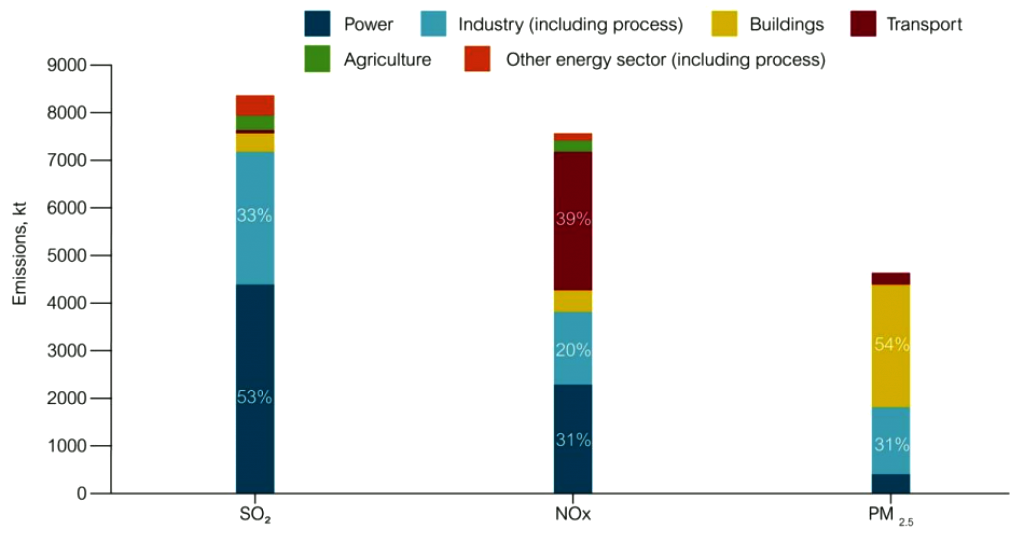Biodiversity & Environment
Pollution from Coal Burning: IEACCC
- 17 Feb 2021
- 6 min read
Why in News
A study by the International Energy Agency’s Clean Coal Centre (IEACCC) has stated that coal burning is responsible for heavy air pollution in India.
- Recently, a Delhi-based think tank Centre for Science and Environment (CSE) has also discussed the measures to reduce carbon dioxide (CO2) footprints of India’s coal-based power sector and cautioned the Union Ministry of Environment, Forest and Climate Change (MoEF&CC) against extending the deadline of meeting emission norms for coal-based thermal power plants in the country.
Key Points
- Findings:
- Pollution from Coal-Based Thermal Power Stations:
- Coal-based thermal power stations contribute over half sulphur dioxide (SO2), 30% oxides of nitrogen (NOx), about 20% particulate matter (PM), etc.
- Persistent burning of coal in thermal power stations and a delay in implementation of latest carbon capture storage technology are among major reasons of air pollution in India.
- Pollution from Other Sectors:
- Transport and other industrial sectors stand second to coal-based thermal power stations as a contributor to air pollution.
- Pollution from Coal-Based Thermal Power Stations:
- Suggestions:
- Retirement of Old Fleet of Power Stations:
- To limit pollution and improve the fleet efficiency by adopting clean coal technology.
- Investment in Cleaner and Advanced Technology:
- The most new advanced technology plants in India - such as Mundra and Sassan in Gujarat are struggling financially, causing stakeholders to lose confidence in investing in cleaner and advanced technology.
- Launch More Ambitious Schemes:
- The current energy efficiency schemes, including performance and achieve trade scheme, efficiency standards scheme and carbon pricing schemes, are not ambitious enough to drive significant improvement.
- Adopting Carbon Capture, Utilization, and Storage (CCUS):
- It is equally important to reduce emissions. It suggested India to include it as a part of its climate commitment.
- CCUS is the process of capturing waste CO2, transporting it to a storage site and depositing it where it will not enter the atmosphere.
- Retirement of Old Fleet of Power Stations:
Coal Burning and Pollution
- Coal Formation:
- Formed deep underground over thousands of years of heat and pressure, coal is a carbon-rich black rock that releases energy when burned.
- Air Pollution:
- When coal is burned, it releases a number of airborne toxins and pollutants.
- They include mercury, lead, sulfur dioxide, nitrogen oxides, particulates, and various other heavy metals.
- Health impacts can range from asthma and breathing difficulties, to brain damage, heart problems, cancer, neurological disorders, and premature death.
- Water Pollution:
- The coal-fired power plants produce more than 100 million tons of coal ash every year.
- More than half of that waste ends up in ponds, lakes, landfills, and other sites where, over time, it can contaminate waterways and drinking water supplies.
- Other water impacts include acid rock drainage from coal mines, the destruction of mountain streams and valleys by mountaintop removal mining, and the energy-water collisions that occur when coal plants rely too heavily on local water supplies.
- The coal-fired power plants produce more than 100 million tons of coal ash every year.
- Climate Change:
- Coal is a large contributor to Global Warming.
- Initiatives to Control Emissions from Power Plants:
- Exploring CCUS:
- India is exploring its potential, as a plant at the industrial port of Tamil Nadu’s Tuticorin has begun capturing CO2 from its own coal-powered boiler and using it to make baking soda.
- Emission Standard:
- India has issued orders for thermal power plants to comply with emissions standards for installing Flue Gas Desulphurization (FGD) units that cut emissions of toxic sulphur dioxide.
- Graded Action Plan:
- The Ministry of Power has proposed a "graded action plan," whereby areas where plants are located would be graded according to the severity of pollution, with Region 1 referring to critically polluted areas, and Region 5 being the least polluted.
- Exploring CCUS:
International Energy Agency’s Clean Coal Centre
- About:
- It is a technology collaboration programme, organised under the International Energy Agency.
- Members:
- It has 17 members, made up of contracting parties and sponsoring organisations.
- India's Bharat Heavy Electricals Limited (BHEL) is a sponsoring organisation.
- Location:
- Based in London with a team of engineers, scientists and other experts.
- Support:
- It is supported financially by national governments (contracting parties) and by corporate industrial organisations.
- Mission:
- To provide independent information and analysis on how coal can become a cleaner source of energy, compatible with the United Nations Sustainable Development Goals.
- To address the role of coal in the energy trilemma and the need to balance security of supply, affordability and environmental issues.
- To focus on reducing emissions of CO2 and other pollutants from coal use through High Efficiency, Low Emissions (HELE) technologies.





